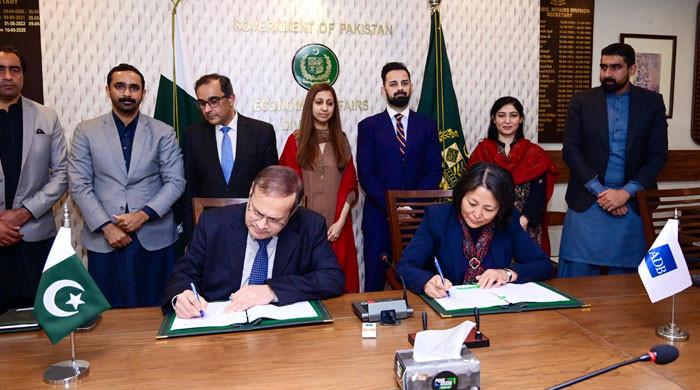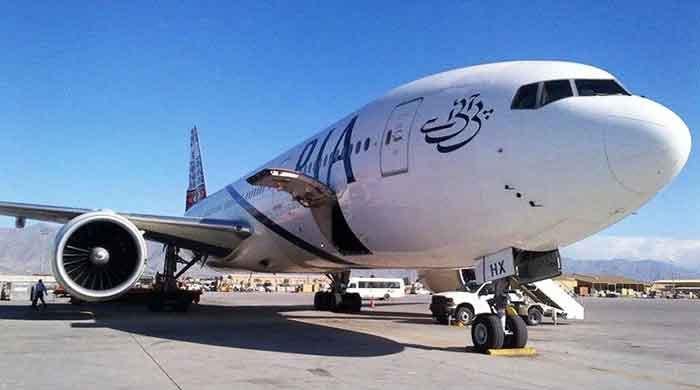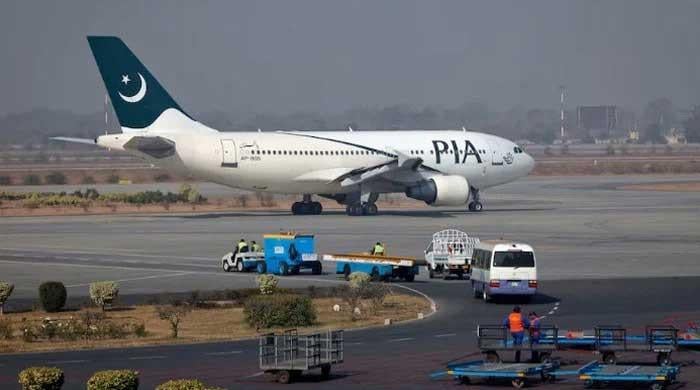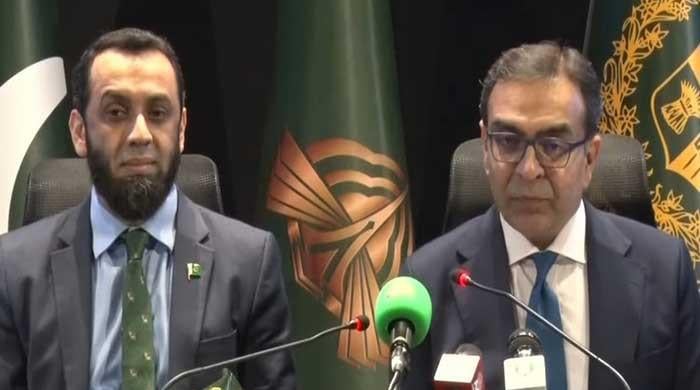Pakistani officials off to Moscow amid possibility of Russian oil deal
Pakistani delegation leaves for Moscow to explore possibilities of buying crude oil at discounted rates
November 28, 2022
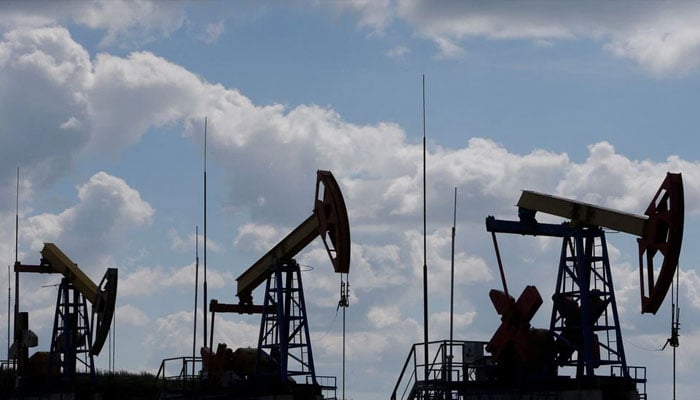
- Dr Musadik Malik-led delegation expected to explore all possibilities.
- Finance Minister Ishaq Dar hopes visit to be successful.
- US-led coalition to fix Russian oil rate at lower than market rates.
ISLAMABAD: Pakistan may be inching closer towards striking an oil import deal with Russia as top petroleum division officials are off to Moscow to explore possibilities of buying Russian crude oil at discounted rates, The News reported.
The delegation comprising State Minister for Petroleum Division Dr Musadik Malik, Captain (retd) Muhammad Mahmood, Additional Secretary (In-charge) Petroleum Division, and other senior officials will also discuss the mode of payment, shipment cost, etc.
Earlier, talking to a private news channel, Federal Minister for Finance Ishaq Dar said the delegation would hold talks with the Russian oil authorities to cut a potential import deal.
“We should pray that the visit is successful and the government manages to secure a deal on favourable terms and conditions," he said while speaking to the TV channel on Friday.
“Both sides would also deliberate futuristic cooperative areas including two gas pipelines that include the much-touted Pakistan Stream Gas Pipeline (PSGP), to be laid from Karachi to Lahore and a trans-nations gasline from Russia via Kazakhstan to Pakistan,” one of the top officials of the Energy Ministry told The News.
“Pakistan would discuss on how to import crude oil from Russia, advance on stalled negotiations about the $3 billion PSGP, and a newly-proposed trans-nations gasline from Russia via Kazakhstan to Pakistan,” he explained.
“The officials of the Pakistan Embassy in Moscow would also be a part of the talks.”
According to industrial ministry sources, Russian crude oil can be processed in Pakistan’s refineries, and in the past one private refinery had used Russian crude oil and made finished products out of it.
Under sanctions by the US, EU and the UK due to the invasion of Ukraine, Russian ships are not allowed to transport fuel products to any country. Now under the current scenario, traders purchase the Russian oil and sell it to the buyer country with a 5-6 per cent premium.
This is how the cost of the Russian product also escalates because of the premium of traders and shipping costs.
The main problem will be the mode of payment for Pakistan if it imports Russian oil. Russia gets the rubles from the buying countries, and the rubles are linked with gold.
However, after the payment mode is finalised, and if the landed cost of Russian crude oil in Pakistan remains feasible even after traders’ premiums and shipping and insurance costs, then some refineries would not hesitate to import the Russian oil.
The industrial sources said that it all depends on the discounted price, mode of payment and shipping cost Pakistan’s official delegation negotiates with the Russian authorities.
The US and EU and UK are intending to impose by December 5 a price cap on Russian crude oil in the international market somewhere between $65 and $70 per barrel. However, there are reports that some EU countries may have differences of opinion on the price cap, which may delay the announcement of the price of Russian oil by G-7 countries.
Russia’s flagship crude grade Urals currently trades at around $52 per barrel, more than $10 a barrel lower than the low end of a proposed G7-EU-UK price cap of $65-$70 per Russian barrel of crude.
After the price cap, the EU countries would use their own vessels for using the Russian oil below the price cap and transactions would be done through their banks under SWIFT mode.
However, there are also reports that Russia would retaliate in case of the imposition of the price cap. Russia would take it as its defeat and can retaliate by reducing the flow of its crude oil in the international market, which will help surge the crude oil price to an unimaginable level and would increase its emphasis on exporting its crude oil to the buyer countries on the bilateral level as it is currently doing with India and China based on transaction through rubles.
And more importantly, OPEC (Organisation of Petroleum Exporting Countries) may also retaliate in case of the price cap on Russian oil fearing that the EU and Asian countries would go for the purchase of Russian oil because of the price cap and their sale would get hurt. The G7 countries are also making up their mind to impose the price cap on Russian finished oil products.
Coming to the $3 billion Pakistan Stream Gas Pipeline project, the official said that the Russian side would take up this project with the visiting delegation. The progress on the shareholding agreement on PSGP between Russia and Pakistan was made to a reasonable extent, but on some clauses, there was no advancement. It was supposed to be inked in Moscow during the visit of Imran Khan, the then-prime minister, to Russia on Feb 24-25, 2022. However, Russia invaded Ukraine during Imran Khan’s visit to Moscow, and the US, EU, and the UK imposed sanctions on Russia and its entities, also involved in the PSGP project. “Since then, further talks on PSGP were not held between Pakistan and Russia.”
As far as the newly-proposed trans-nations pipeline, Russia provides gas to Kazakhstan and wants to extend the pipeline to Pakistan through Afghanistan. “Moscow also wants to make the TAPI project part of its Kazakhstan pipeline project.”
The import of Russian oil and gas has been a much-talked-about subject in Pakistan since the ouster of the PTI government, when former prime minister Imran Khan claimed to have achieved a breakthrough during his visit to Moscow in February 2022.
Later, he accused the present rulers of backtracking from it under the influence of the US after Russia invaded Ukraine.
According to official documents, the work started for talks on Russian oil and gas after Prime Minister Shehbaz Sharif met with Russian President Vladimir Putin in Samarkand on the sidelines of the SCO summit in September this year.
As a follow-up, Dr Malik approached the Russian minister of energy and expressed the desire of Pakistan to enter into an arrangement with the Russian authorities for importing two to three LNG cargoes per month in the immediate future as well as on a long-term basis.
The letter written by the Petroleum Division in the middle of October this year received a response from the Russian energy minister and the Russian Embassy in Pakistan.
In a forwarded communication to Dr Malik, the Russian authorities proposed the minister meet with representatives of Russian companies to discuss the issue of LNG supplies to Pakistan.
The documents revealed that Pakistan’s Ministry of Foreign Affairs also informed the government about its correspondence with the US Embassy in Pakistan.
Meanwhile, the US Embassy informed the foreign ministry that coalition groups, including the US, G7, EU, and Australia have agreed to finalise the cap on Russian oil, which would benefit oil importers from Russia. Pakistan could also take advantage of this development.
Pakistan termed the positive response from the Russian side encouraging in light of the prevailing tight market for LNG, the cap on Russian oil, and Pakistan’s rising energy demand.
Following the receipt of a positive response from Russia, the prime minister proposed to send a two-member delegation to Moscow for two days, according to the official letter.




